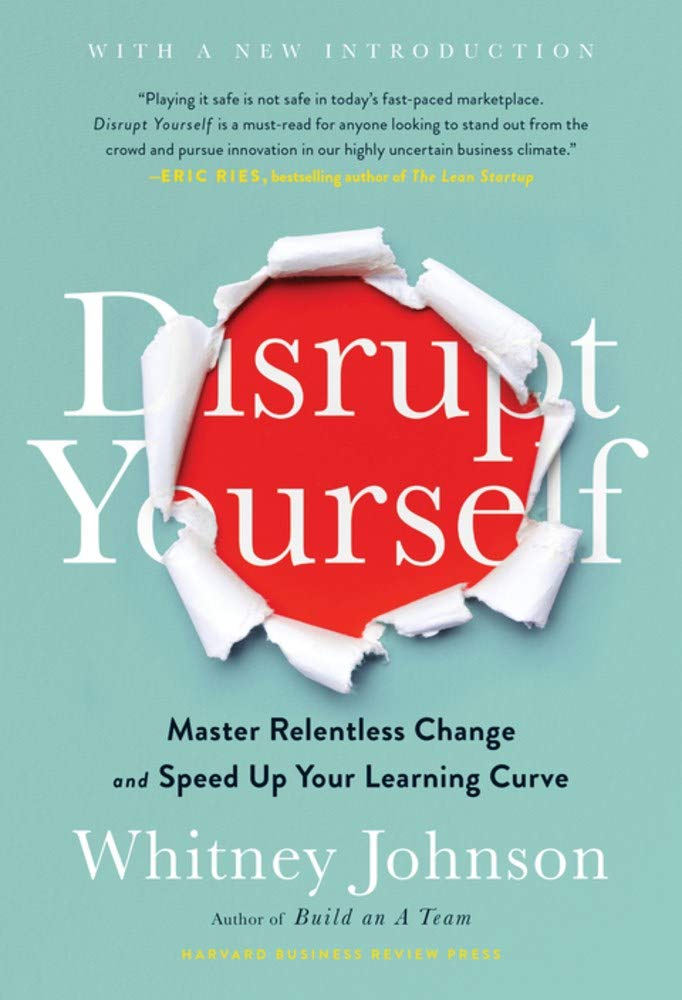A Prudent Project


Exploring the application of Whitney Johnson’s four principles of self-disruption in addressing unconscious bias in intelligence analysis
About the Book
Whitney Johnson’s "Disrupt Yourself" is a compelling and deeply practical exploration of how individuals can transform their professional effectiveness by deliberately disrupting familiar patterns of thinking, behavior, and identity.
This book was required reading for a past leadership event I attended, and it became a foundational reference point for how I think about professional growth, decision-making, and adaptability. Over time, it evolved into something closer to a personal field manual—particularly relevant in disciplines where judgment, interpretation, and adaptability are mission-critical.
Johnson extends the concept of disruptive innovation, traditionally applied to organizations and technologies, to individual careers. Rather than focusing on stability or linear advancement, she argues that sustained excellence requires intentional discomfort, continuous recalibration, and the courage to abandon outdated mental models. Through narratives of individuals who stepped away from conventional trajectories, she demonstrates how purposeful disruption can unlock higher levels of performance and insight.
For intelligence analysts, this framework is especially powerful. Intelligence work depends on interpretation under uncertainty, yet analysts—like all professionals—are vulnerable to unconscious bias, cognitive inertia, and overreliance on familiar analytic frameworks. Johnson’s work provides a structured way to challenge these tendencies without undermining analytic rigor.
At the center of the book are the Four Principles of Self-Disruption, articulated and expanded upon by Harvard Business Review. These principles provide a disciplined yet flexible framework for analysts seeking to improve analytic accuracy, reduce bias, and enhance decision advantage:
1. Target a need that can be met more effectively
In organizational disruption, innovation begins by identifying unmet or poorly met needs. Johnson argues that individuals must do the same.
In intelligence analysis, this translates into identifying analytic gaps—areas where existing methodologies, assumptions, or cultural norms limit accuracy or inclusivity of perspectives. Analysts who recognize where bias subtly distorts threat assessments, strategic forecasts, or cultural interpretations position themselves to add disproportionate value.
Just as Salesforce transformed CRM by addressing underserved users with a new delivery model, analysts who identify blind spots—whether cultural, cognitive, or procedural—can disrupt entrenched analytic practices by addressing needs that traditional approaches fail to meet.
2. Identify your disruptive strengths
Self-disruption requires a clear understanding of what differentiates one analyst from another.
In the intelligence context, disruptive strengths may include:
Cross-cultural fluency
Cognitive diversity (e.g., pattern recognition, synthesis, or red teaming)
Deep regional or functional expertise
The ability to translate complex intelligence into decision-ready insight
Analysts who recognize and deliberately apply these strengths are better positioned to challenge dominant narratives and reduce groupthink. Rather than conforming to analytic norms, they expand the analytic aperture.
As Johnson illustrates through individuals who combined unconventional skill sets, intelligence analysts who lean into their unique strengths can redefine how intelligence problems are framed and solved.
3. Step back (or sideways) to grow
Johnson challenges the assumption that growth must always be vertical. Sometimes the most meaningful development occurs through lateral movement or temporary regression.
Within intelligence organizations, this may involve:
Rotations across analytic disciplines
Assignments in operational, policy, or liaison roles
Exposure to alternative analytic methodologies
These moves disrupt habitual thinking patterns and expose analysts to perspectives that reduce unconscious bias. Stepping outside a primary analytic lane allows analysts to understand how intelligence is consumed, misinterpreted, or constrained—leading to more effective and empathetic analysis.
4. Let your strategy emerge
Rather than rigid career planning, Johnson advocates for emergent strategy—learning through action, feedback, and iteration.
In intelligence analysis, this principle aligns with adaptive tradecraft. Analysts who test hypotheses, seek disconfirming evidence, and adjust analytic frameworks in response to new data embody this approach. Rather than clinging to initial judgments, they allow insights to evolve organically.
This flexibility is critical in countering bias. Analysts who embrace uncertainty and iterative learning are less likely to anchor prematurely or fall prey to confirmation bias.
The relevance of self-disruption to intelligence work
Self-disruption is neither comfortable nor risk-free.
It requires analysts to question long-held assumptions, confront uncertainty, and accept temporary inefficiency in pursuit of long-term analytic clarity. It also demands resilience in environments where deviation from consensus can be professionally risky.
Through its emphasis on courage, adaptability, and intentional growth, Disrupt Yourself provides a powerful conceptual framework for intelligence professionals seeking to enhance analytic integrity. The book underscores a central truth: the most critical innovation in intelligence is not technological—it is cognitive..
Disrupt Yourself by Whitney Johnson (CEO of Disruption Advisors).
Published by Harvard Business Review Press (November 12, 2019)
Explore our other recent projects:
The Question of a Coup: Applying Calculus in Intelligence Calculations: A practical intelligence manual showing how calculus-based reasoning can prevent false certainty, expose hidden coordination, and reduce strategic surprise in coup analysis.
National socio-digital early warning and strategic foresight architecture: a computational intelligence ecosystem to anticipate mass sentiment shifts before coordinated unrest and destabilization emerge.
Understanding the Lockwood Analytical Method for Prediction (LAMP): my firsthand experience applying one of the intelligence community’s most rigorous forecasting methodologies.
Self-disruption research: Applied Whitney Johnson's four principles of self-disruption in addressing unconscious bias among intelligence analysts.
Intelligence training manual: Self-disruption as analytic tradecraft
Self-disruption as analytic tradecraft: Classified-style analytic vignettes and tradecraft alignment
Not Intelligence-Related:


